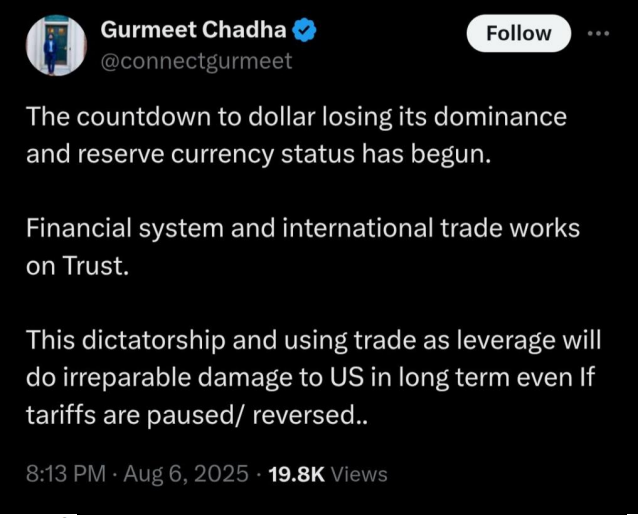Financial Expert Warns of Long-Term Consequences from Weaponizing Trade and Dollar’s Fall.
In a sharp critique of U.S. trade policy, financial advisor Gurmeet Chadha has warned that the United States risks long-term economic consequences by weaponizing trade, particularly under former President Donald Trump’s administration.
Chadha, founder of Complete Circle Consultants, took to social media platform X to express concern over the latest tariff move targeting India, stating:
“The countdown to the Dollar’s Fall losing its dominance and reserve currency status has begun.”
Trump’s Tariff Hike
His remarks follow Trump’s announcement of a 25% increase in tariffs on all Indian imports, raising the total duty to 50%.
The decision stems from India’s continued oil trade with Russia, which the former U.S. president claims threatens American national security.
Tariff Hike Under the International Emergency Economic Powers Act (IEEPA)
The executive order, signed by Trump, invokes the International Emergency Economic Powers Act (IEEPA). Under this provision, the U.S. government can respond to threats deemed a national security concern by imposing economic sanctions or trade restrictions.
In this case, India’s persistent purchases of Russian oil have prompted the additional tariff hike.
India has been given a 21-day grace period before the new duties are enforced. During this window, U.S. trade negotiators are expected to visit New Delhi on August 25 to discuss the issue with Indian officials and potentially negotiate a rollback if India alters its trade behavior.
India’s Exports to the U.S. at Risk
India currently exports over $80 billion worth of goods annually to the United States, making the U.S. one of its largest trading partners.
While around 50% of these exports, including pharmaceuticals and electronics, are reportedly exempt from the new tariff, other major industries are likely to bear the brunt:
- Textiles and garments
- Auto components
- Engineering goods
These industries contribute significantly to India’s GDP and employment, making the tariffs a serious concern for the country’s economy.
Chadha: Trade Leverage Could Backfire on the U.S.
Chadha emphasized that the strength and dominance of the U.S. dollar’s fall are underpinned not just by economic fundamentals, but by global trust in the American financial system.
He cautioned that using trade tools coercively, as leverage for foreign policy objectives, could erode that trust permanently.

Link 🔗- Gurmeet Chadha on X
“This dictatorship and using trade as leverage will do irreparable damage to [the] U.S. in the long term—even if such measures are later reversed.”
His comments echo wider concerns that the global financial ecosystem—long dominated by the U.S. dollar’s fall—may begin to pivot towards alternatives if America continues to politicize economic relationships.
White House Leaves Room for Policy Reversal
Despite the strong stance taken in the executive order, the White House has indicated flexibility, stating that the tariffs could be modified or lifted if India changes its oil import policy or trade posture.
However, with India deepening energy ties with Russia and reinforcing its stance on a multipolar global economy, immediate policy shifts appear unlikely.
Indian officials have yet to issue a formal response, though political and business leaders across the country have expressed concerns about the move’s economic impact.
Geopolitical Tensions Spill Into Trade
The U.S. decision to impose steep tariffs on Indian imports underscores the growing intersection of geopolitics and global trade.
While the move aims to pressure India over its energy ties with Russia, it also risks unsettling bilateral relations and shaking confidence in the U.S. as a reliable economic partner.
As Gurmeet Chadha warns, the broader consequence could be a gradual erosion of the U.S. dollar’s fall global reserve status—a shift that would profoundly reshape international finance and trade for decades to come.









